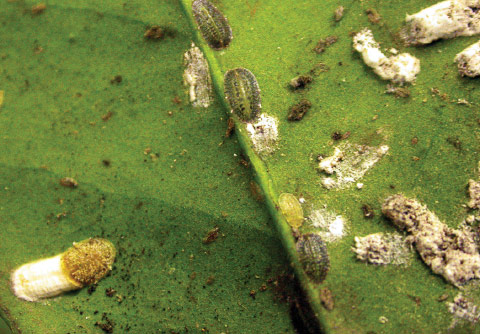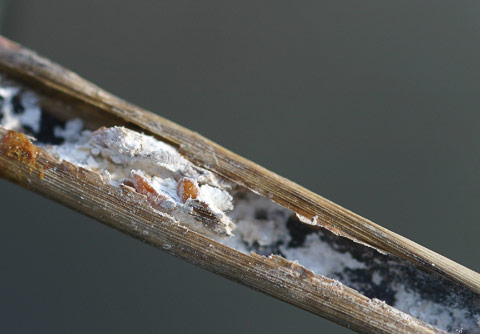In Hot Water
Portable Immersion System Thwarts Pests of Ornamental Plants
 |
 |
|
The hot water immersion system effectively treats pests such as cottony camellia scale (top) and miscanthus mealybug (bottom). These pests can cause severe damage to landscape plants if left untreated. Photos by Suzanne Klick. |
In the $10 billion U.S. nursery industry, getting stock plant cuttings off to a pest-free start can prevent costly infestations and pesticide treatments later. A new machine, now being refined for commercial use, controls numerous pests in these young plants with an exceptionally low-risk treatment: hot water.
Nursery managers propagate many plant species using cuttings from stock plants, but stock plants can have small infestations of pests that are difficult to detect, such as mealybug, thrips, aphids, or spider mites. Insecticide use is problematic during this early growth stage: conventional applications are impractical on unrooted plants, and alternatives such as dipping cuttings in pesticide-filled tanks can pose risks to employees.
Stanton Gill leads a University of Maryland Cooperative Extension team that developed a prototype of the hot-water immersion system with Northeast IPM funds. The device heats large amounts of water quickly and maintains the specified temperature while it circulates water around large numbers of plant cuttings.
“There’s a small temperature window,” Gill says, “at which insect pests die and plant material is tolerant.” Testing the effects of high water temperatures on various plant and pest species, the team identified temperatures and treatment times that kill pests without damaging plants.
The results convince Gill that the new device has strong potential for controlling scales, mites, and aphids. “We’ve had particular success with controlling minute cypress scale on Leyland cypress and soft scale on holly.” The team is also exploring the system’s potential for plant disease control.
The immersion system is being refined for commercial use, with easy controls and an affordable price tag. Once the hot water immersion system is available to the nursery industry, it will increase the safety of workers, who would otherwise have to dip plant cuttings in pesticides. The device will also potentially reduce losses from plant damage, as well as the costs of pesticide used to control insects as plants grow.
To learn more about this project, contact Stanton Gill.
— by ELIZABETH MYERS
The Northeastern IPM Center promotes integrated pest management for reducing risks to human health and the environment. If republishing our news, please acknowledge the source (“From Northeast IPM Insights”) along with a link to our website.
